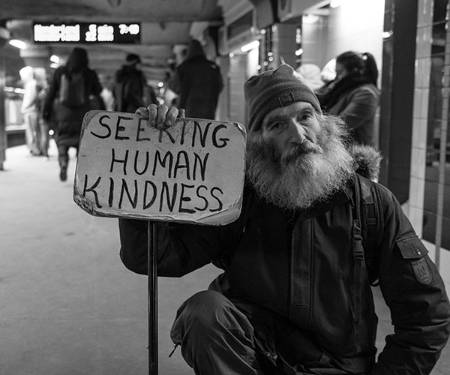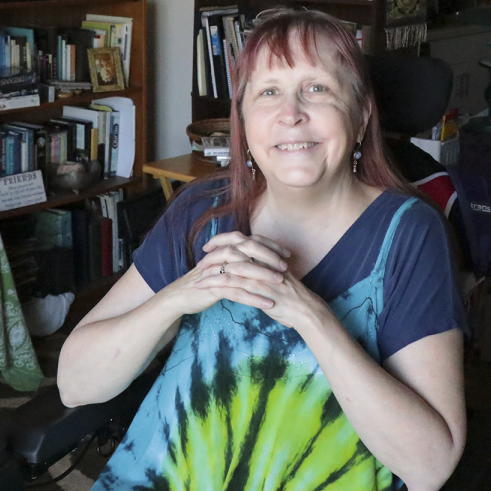A Rolling Perspective: SOS

Photo by Matt Collamer on Unsplash.
If they hadn’t been so confident that the Titanic was indestructible, would the captain and crew have paid more attention? Would they have seen the danger in enough time to avert disaster?
If our nation were a ship, it would be the Titanic, facing the looming iceberg of an already unprecedented housing crisis. Making it about political parties or “sides” is about as helpful as the Titanic’s crew exchanging I told you so!s as the ship sinks into the icy ocean. It’s time to stop, look, and listen to those on the front lines of homelessness. It’s happening, right now, to someone you know. This tragedy is playing in a venue near you.
Case in point: I went to court recently to support my fiercely independent, nearly seventy-year old friend Mary (not her real name), who works on and off as a flagger. She's rented a rambling, ramshackle, 100-year-old farmhouse in the middle of a forest—no cell phone service, no internet, wood stove for heat—for fourteen years. She has always paid her rent in full and on time. The relationship between Mary and the landlord was so friendly, she was not concerned that she did not have a lease. She was in court because his adopted son, “Jim,” (a tattooed, burly ex-convict) had handed her a No Cause eviction notice and Mary was contesting it. Jim was in court the day I attended. Even the judge appeared afraid of him, yet Mary was forced to share a table and microphone with him. The judge noted Mary’s terror and asked: Why would Mary even want to stay on the property, derelict as it was? Why not just move?
I was flabbergasted. Not only does Mary not have the money, but there is no place for her to go. Low-income housing waiting lists are years long. Apartment life would kill her beautiful, free spirit. I know it nearly killed mine. As for Mary’s case, the judge postponed the eviction and kicked Mary's case up to the next level.
Before MS, I was like Mary—independent, willing, and able to work hard. I had a car. I could move from a home if needed. Why would I put myself on a housing list?
Lest you believe this has nothing to do with you because you’re young, able-bodied, or well-off financially, please read on.
While it’s difficult for disabled, elderly, returning wounded military, or the poor to secure services, at least we have some. Middle-aged people who suddenly lose their jobs because of downsizing, ill health, robotics, or age (and oh, it happens all the time) won’t qualify for EBT or rent assistance. If you’re not adjudged disabled enough to get SSDI, you’re expected to work. Chances are slim you’ll be hired at all, or you’ll earn such low wages you cannot support yourself.
Because so many middle-class people can’t afford their big cities anymore, they’re moving out in droves to small towns, rural areas, and states with lower taxes. With their extra cash, they gentrify their home and ensure rising living costs. Affordable housing options vanish.
Towns like mine, made up mostly of retirees, have few housing options, no public transport systems, and few services. The residents have either paid off their mortgage or sold their city home for tons o’ cash. They can easily afford the vehicles that take them to full-service cities. They don’t see the need for reliable, affordable transport or services. They look down on those of us in public or Section 8 housing, assuming we made “lifestyle choices” that landed us at the bottom. Their smugness baffles me, for it’s only a matter of time before their doctor tells them they can’t drive, or gentrification causes such a hike in the cost of living they can’t afford their mobile home plot, or they become disabled. They’ll smack into the iceberg, and it will be too late to put services in place.
Were you aware that there are 3.5 million homeless people in the US right now? A frightening number of them are “working homeless” who do not earn enough to pay rent, and if you rent, you’re at risk of homelessness. If the bank owns your home, you’re still vulnerable. Market fluctuations are a natural component of free markets, yet millions ignore this fact.
Only if you own your home outright are you safe. Or are you? Disability can happen to anyone, at any time. If a government agency or utility company wants your property, they can take it by declaring eminent domain. The chances increase daily that your dwelling will be destroyed by fire, earthquake, or flood.
Pretending that all is well and “it can never happen to me” signals a particular type of blindness that is far worse than any disability qualifying for SSDI. Those on the uppermost tiers of the Ship of Greed ignore the iceberg. They’re busy not only arranging the Titanic’s deck chairs, but choosing new cushions and looking for a handyman who can resurface the deck.
We’re on this ship together, whether Captain’s deck, ballroom, galleys, or steerage. Below decks, we can hear the groans and and creaks as the keel scrapes ice, but we’re not in a position to do anything but yell. Captains squabble over who’s right. The wealthy dance and dine. The rest of us are left to our own (assistive) devices.
Creative ways abound to address our titanic homeless crisis, but first every passenger—regardless of political affiliation, nationality, religion, or race—must acknowledge the iceberg. For our ship to be saved, those contributing to the housing crisis by succumbing to the siren call of wealth need to focus less on wealth creation and more on the plight of their fellow passengers. If this ship founders, we all go down. Your money will not save you then.
SOS: Save Our Ship. Those of us below decks are counting on you.
Jennifer Holland taught herself to read and write at age four and has been doing both ever since. Minnesota-born and Wisconsin-bred, she nonetheless inherited the Irish perchant for travel. Despite the shoestring budget, she visited a dozen countries before her diff-ablement, and even lived in Ireland for nearly fifteen years. Her encounters with other cultures inform the quirky insights into human behavior that find their expression in her poetry, novels, and non-fiction works. When she's not reading or writing, she enjoys chair yoga, video chats with her children and gradchildren, and living happily with MS on a tiny fixed income.


